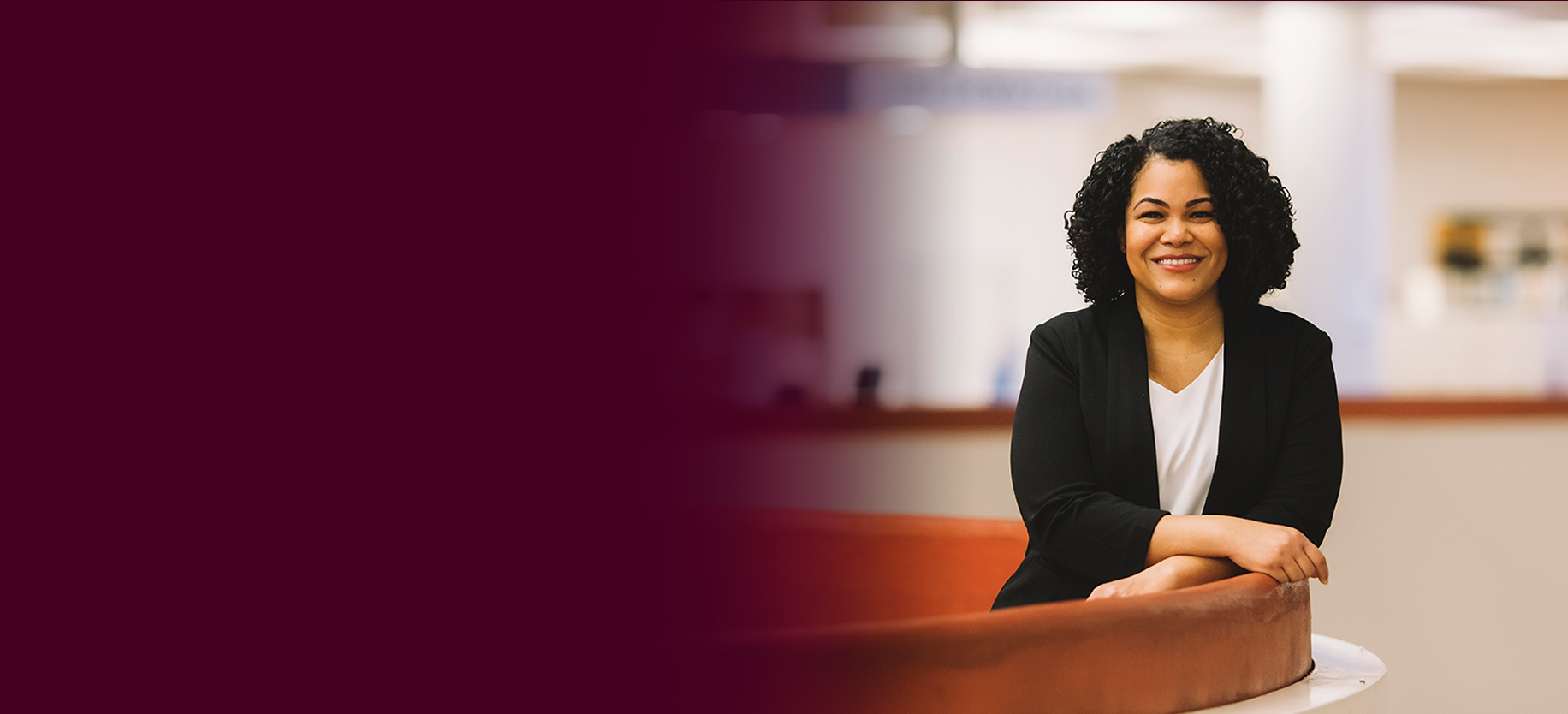Kimberly Nemeth joined Burgundy Asset Management in 2017 with a focus on institutional client relations. Kimberly earned a Bachelor of Arts (Mathematics) at Bard College, and is Co-President of Burgundy’s Client-Facing Mentorship Program. In conversation with Robyn Ross, Burgundy’s Head of People and Talent, Kimberly shares her journey to Burgundy and to investing from her hometown in Kingston, Jamaica.
Robyn Ross (RR): Please tell us about your childhood.
Kimberly Nemeth (KN): I had a wonderful childhood growing up in Kingston, Jamaica. My parents were very supportive and great examples of what it means to always put family first. They sheltered me from a lot of our struggles but taught me that nothing is ever just handed to you in life. I am the eldest among my siblings, so a lot was expected of me. I took my studies seriously and enrolled in a performing arts school for extracurricular activities. It was a creative outlet for acting, singing, dancing, and performing in summer and Christmas productions. Apart from being loads of fun, this experience taught me discipline and the importance of teamwork and fostered a life-long appreciation for the performing arts.
“Opportunity doesn’t mean someone giving you an interview or even a job. It extends deeper than this. It is having mentors within your organization who want to support you. Are there people who will take you under their wing and people whom you can trust?”
RR: How would your high school teachers and friends describe you?
KN: My teachers would describe me as studious but cheeky. My friends would describe me as fun-loving. It was in high school that my confidence really started to build. My closest circle was a group of girls who were high achievers but humble and level-headed. They pushed me to stay competitive and we had a good balance of “work hard, play hard”. When you surround yourself with genuine people who want more out of life, you’re inspired to want more as well. The company you keep matters.
RR: Why did you decide to go to New York for university?
KN: The expectation that I would study abroad was set during high school. I was fortunate enough that my grades and student financial aid could get me there. A higher education meant more independence and more opportunities. I soon narrowed down my choices to liberal arts schools and chose Bard College so that I could focus on academics and still have a connection to the arts.
RR: What was it like settling into a new country and university far away from home?
KN: It was a bit of a culture shock, but I went to New York with an open mind, ready to meet new people and learn from new experiences. I was embraced by my new peers, some of whom had never met or been friends with a Jamaican. Similarly, I had been living in a bubble in Jamaica and was now being fully immersed in American culture amongst liberal young adults. I met a few of my firsts there as well: my first Jewish friend, my first friend from the LGBTQ+ community, and my first friend from Ethiopia. Meeting new friends from all walks of life expanded my horizons and the depth of my social aptitude. I think it’s important to become friends with people who aren’t like you so you can learn from other points of view.
RR: You graduated with a Liberal Arts Degree in Math – did you choose finance as the industry you were going to work in from the get-go?
KN: Funnily enough, I initially declared Chemistry as my major, in order to pursue medical school. Turns out I wasn’t as interested in Organic Chemistry as I was in Math. In retrospect, I wasn’t entirely sure what I wanted to do; the only thing I knew with certainty was that I wanted to make my parents proud.
I ultimately decided to pursue the financial industry because the field appeared to be dynamic, challenging, and lucrative. It had the appeal of working with numbers and with people. My family had immigrated to Canada while I was studying in New York, so after graduation, I packed up and moved to Oshawa.
RR: As a new immigrant to Canada, how did you go about finding a job in finance?
KN: Looking back, I had 100% blind optimism. I was under the naïve assumption that earning a bachelor’s degree would land me a good job. I thought it would be easy, but it was not. I quickly learned that I also needed social capital and a good network. I was very discouraged. I had so many high hopes but not much guidance in terms of real opportunities. I had no Canadian experience and limited Canadian connections.
Discouraged by the rejections and delays, I started working with a recruiting firm. They sent me a job posting at Citco Canada, a hedge fund and private equity fund administrator. Citco was adept at hiring new grads and had an established training program. I started as a junior and left five years later as a manager within their Investor Relations department.
RR: What advice do you have for others in terms of building social capital and a network?
KN: Start to build your network as soon as you can. Don’t be afraid to approach people and tap into as much of your initial network as possible. Ask this initial group to speak on your behalf to their networks. Show that you are hungry. Simultaneously get in touch with recruiters and do your own research.
Be mindful of your internal dialogue, that voice inside your head. When I go into new situations for the first time with some degree of uncertainty, I try to give myself words of encouragement so that even if I don’t know how to do something, I am reminded that I’m capable of figuring it out. Life is all about challenges and obstacles. If I don’t believe in myself, how can I expect others to believe in me? I learned not to underestimate the power of questions and that it is a sign of strength to reach out for help from those more experienced. Having a support system is also important. My mom has been my rock and has kept me grounded. She moved to Canada in her 40s and went from having a managerial position in Jamaica to bagging groceries at Sobeys during her first year in Canada to get our family off the ground. She has always reminded me to never let my expectations get higher than my gratitude. I will always be eternally grateful to my parents for moving us to Canada and all the opportunities it has afforded us.
RR: Since you joined Burgundy, you have held several different positions. Why and how have you thrived with that change?
KN: I started at Burgundy working with the operations team, moved to the investment reporting team, and now serve as a relationship manager for our institutional clients. A combination of hard work, people believing in me, and good timing, resulted in me having the opportunity to fulfill a few different roles at Burgundy. I think living in different countries and moving a number of times also made me very adaptable to change.
When you do good work, people notice, and it pays off. As important as hard work is, the importance of nurturing strong relationships cannot go unsaid. It’s essential to build rapport with mentors and sponsors who will advocate on your behalf and recommend you for opportunities when you are not in the room. It can be tough sometimes to put yourself out there, especially when you are new to an organization, but taking the steps to get to know your colleagues and develop a good reputation will go a long way.
RR: With the increasing focus on social equality globally, what has been a major hurdle you have had to face as a woman of colour in finance?
KN: Building the confidence to own my value at the table and to focus less on what others thought, because it was only holding me back from being my truest self. Michelle Obama, among other women of colour, has openly spoken of the concept of experiencing “Imposter Syndrome”, a feeling that you don’t belong and that you’re just not as good as those around you. A lot of women, and especially women of colour, experience this most often as they are seeking career advancement or simply achieving higher levels of success in their current roles. Michelle overcame this syndrome through building her self-confidence, by reminding herself that this belief had been imposed on her by society, and was not the reality of her situation.
RR: What does equity mean to you as a woman of colour?
KN: I’ll never forget the sociology class I took in New York which focused on the “Inequalities of America” when my professor was lecturing and said that the most disadvantaged people of this world are immigrants, Black people, and women. I started to laugh out loud in the class because I fit all three. He then responded to me saying “Kim, it’s just a statistic”. That’s always stuck with me, and I’ve felt it was my responsibility to try and prove that statistic wrong.
To attain a higher level of success, women of colour need to be given the opportunity and the platform to have their voices heard. It is within that opportunity that equity is achieved. Opportunity doesn’t mean someone giving you an interview or even a job. It extends deeper than this. It is having mentors within your organization who want to support you. Are there people who will take you under their wing and people whom you can trust? Are there people amongst you with whom you can find genuine connections? People enjoy working with people they like. That will never change, it is the foundation to relationship building. My sincere hope is that more women of colour advance into leadership positions and in turn become mentors to others.
RR: Any last piece of advice?
KN: Remain confident in who you are and don’t lose sight of what you’re capable of. Own your authenticity and be kind to yourself.
This post is presented for illustrative and discussion purposes only. It is not intended to provide investment advice and does not consider unique objectives, constraints or financial needs. Under no circumstances does this post suggest that you should time the market in any way or make investment decisions based on the content. Select securities may be used as examples to illustrate Burgundy’s investment philosophy. Burgundy funds or portfolios may or may not hold such securities for the whole demonstrated period. Investors are advised that their investments are not guaranteed, their values change frequently and past performance may not be repeated. This post is not intended as an offer to invest in any investment strategy presented by Burgundy. The information contained in this post is the opinion of Burgundy Asset Management and/or its employees as of the date of the post and is subject to change without notice. Please refer to the Legal section of this website for additional information.

